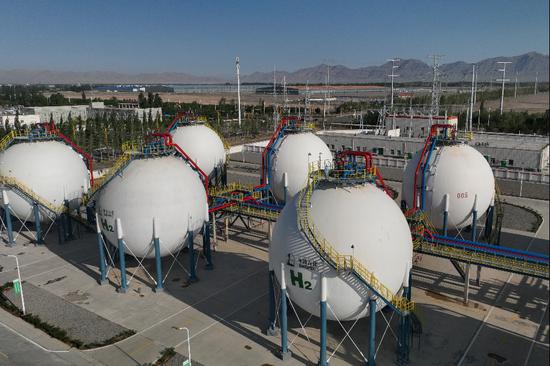Hydrogen energy forecast to see rapid development in nation
China is poised to experience a boom in hydrogen energy development, driven by strong government policies and a rapid decline in renewable energy costs, according to industry experts.
With government-backed incentives, a growing infrastructure for hydrogen production and storage, and a complementary synergy with solar and wind energy, the number of hydrogen fuel-cell vehicles in operation nationwide is projected to reach around 45,000 by the end of 2025, according to the Hydrogen Energy Industry Promotion Association (HEIPA).
The market size for vehicle-mounted hydrogen storage cylinders in China is expected to reach approximately 38 billion yuan ($5.23 billion) to 46 billion yuan between 2025 and 2030, said HEIPA, which is under the China Association for the Promotion of Industrial Development, a Beijing-based trade body.
According to HEIPA, China is positioning itself to become a global leader in hydrogen energy development in the coming years. As of October, China has sold a total of approximately 22,790 hydrogen fuel cell vehicles. The government plans to have around 50,000 fuel cell vehicles in operation by 2025.
Hydrogen energy, as a rich, green and efficient secondary energy source, has become a key pathway for the global energy system's clean and low-carbon transformation. As of November, 53 countries and regions worldwide have developed hydrogen industry development strategies or roadmaps, it said.
China has released over 20 national-level policies to support the hydrogen energy industry this year, covering various areas such as standards development, technological innovation, infrastructure, demonstration and promotion, and equipment upgrades, said Wei Suo, head of HEIPA.
The policy framework is continuously being refined and improved, he said.
Wei said the development of the hydrogen energy sector has shifted from focusing on technological breakthroughs in key areas and pilot demonstrations in the transportation sector to achieving technological advancements across the entire industry chain and scaling up applications in multiple fields.
"Research across the industry chain is also gradually moving from complete vehicle manufacturing to core material development, applied technology research and fundamental research," he said.
Transportation is a leading sector in the development of the hydrogen energy industry, with its commercialization playing a critical role in driving broader industry growth. China has prioritized expanding the use of hydrogen in transportation as a key strategy for accelerating the development of the hydrogen sector, rolling out a series of supportive policies, said the association.
Industry experts believe hydrogen energy, as a clean and versatile energy source, holds the potential to significantly reduce carbon emissions and drive the transformation of the energy sector.
Su Wei, China's chief climate negotiator, said the country has established a hydrogen energy industry system that covers the entire value chain, including hydrogen production, storage, transportation, refueling and equipment manufacturing.
Hydrogen energy is finding broad applications across various sectors, such as industry, power, transportation, and construction, said Su.
Driven by the massive market potential, many Chinese enterprises are already laying out plans for hydrogen development. Since 2024, six provinces, including Shandong and Sichuan, have introduced policies to reduce toll fees for hydrogen vehicles on highways, while many provinces have also proposed the creation of cross-regional hydrogen corridors.
CIMC Enric, which specializes in manufacturing hydrogen-related products including storage tanks, has seen growing popularity of its products in China and overseas markets.
The company established a joint venture company in 2021 with Swedish technology group Hexagon AB to provide safe, economical and efficient storage and transportation solutions for the fast-growing high-pressure hydrogen storage and transportation market in China and Southeast Asia. The JV plans to set up a production line with an annual production capacity of approximately 100,000 units of hydrogen storage cylinders, and the actual output will be gradually increased to achieve the highest production capacity, it said.
In addition to domestic companies, foreign players are also eyeing the massive potential of China's substantial hydrogen market, with companies such as Hexagon and Toyota also making significant strides in the hydrogen sector.
Many provinces are also laying out plans to develop the hydrogen energy sector.
Aiming to position itself as a leader in this emerging field, Guangdong province released on Thursday measures to accelerate the high-quality development of the hydrogen energy industry.
For manufacturing projects in the hydrogen energy industry with an investment of 100 million yuan to 1 billion yuan, a funding reward of 1 percent of the total annual fixed-asset investment after the project is launched will be provided. The maximum reward for a single project will not exceed 10 million yuan, it said.

